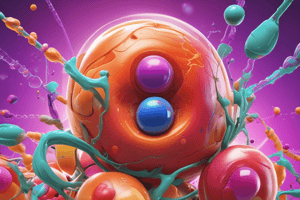Podcast
Questions and Answers
What is the trigger for insulin secretion?
What is the trigger for insulin secretion?
hyperglycemia
What hormones are produced in the pancreas?
What hormones are produced in the pancreas?
insulin and glucagon
What cells produce insulin?
What cells produce insulin?
beta cells
What cells produce glucagon?
What cells produce glucagon?
What is the hormone of plenty?
What is the hormone of plenty?
What is the important thing to remember about insulin?
What is the important thing to remember about insulin?
What is the trigger for glucagon secretion?
What is the trigger for glucagon secretion?
What are symptoms of untreated diabetes?
What are symptoms of untreated diabetes?
What is diabetes mellitus?
What is diabetes mellitus?
What is Type 1 Diabetes?
What is Type 1 Diabetes?
What is Type 2 Diabetes?
What is Type 2 Diabetes?
What type of DM is insulin dependent?
What type of DM is insulin dependent?
What is a byproduct of fat being used to make ATP?
What is a byproduct of fat being used to make ATP?
What is DKA?
What is DKA?
How is DKA treated?
How is DKA treated?
Does blood become acidic or alkaline in DKA?
Does blood become acidic or alkaline in DKA?
What is a typical glucose reading if a patient is in DKA?
What is a typical glucose reading if a patient is in DKA?
What are the long-term complications from untreated or poorly controlled DM?
What are the long-term complications from untreated or poorly controlled DM?
Is there a cure for DM?
Is there a cure for DM?
How are DM 1 and DM 2 alike?
How are DM 1 and DM 2 alike?
How are DM 1 and DM 2 different?
How are DM 1 and DM 2 different?
What type of DM is most common?
What type of DM is most common?
Why can't insulin be given PO?
Why can't insulin be given PO?
What can happen if you give insulin to the wrong patient?
What can happen if you give insulin to the wrong patient?
Should you hold long-acting insulin if BBG is low?
Should you hold long-acting insulin if BBG is low?
How does Rapid-Acting Insulin work?
How does Rapid-Acting Insulin work?
How does Short-Acting insulin work?
How does Short-Acting insulin work?
How does Intermediate-Acting insulin work?
How does Intermediate-Acting insulin work?
How does Long-Acting Insulin work?
How does Long-Acting Insulin work?
What are s/s of Hypoglycemia?
What are s/s of Hypoglycemia?
What are s/s of Hyperglycemia?
What are s/s of Hyperglycemia?
Hypoglycemia is aka
Hypoglycemia is aka
What is the most commonly used preparation of insulin?
What is the most commonly used preparation of insulin?
When should a patient eat a meal after receiving an insulin injection?
When should a patient eat a meal after receiving an insulin injection?
Which insulin cannot be mixed with other solutions?
Which insulin cannot be mixed with other solutions?
What should you not do when injecting insulin?
What should you not do when injecting insulin?
What is the treatment of choice for diabetes during pregnancy?
What is the treatment of choice for diabetes during pregnancy?
During pregnancy, insulin may need to be increased during the last ___.
During pregnancy, insulin may need to be increased during the last ___.
What type of injection devices may an older adult benefit from when self-administering insulin? Why?
What type of injection devices may an older adult benefit from when self-administering insulin? Why?
How should insulin pens be stored?
How should insulin pens be stored?
What are noninsulin antidiabetic drugs?
What are noninsulin antidiabetic drugs?
How are drug dosages based for DM2?
How are drug dosages based for DM2?
How many classes are there of noninsulin antidiabetic drugs?
How many classes are there of noninsulin antidiabetic drugs?
Which age group is the most difficult to control DM1?
Which age group is the most difficult to control DM1?
What is the noninsulin diabetic drug that cannot be used for DM1?
What is the noninsulin diabetic drug that cannot be used for DM1?
What is the MOA of insulin secretagogues?
What is the MOA of insulin secretagogues?
What is the MOA of insulin sensitizers?
What is the MOA of insulin sensitizers?
What is the MOA of incretin mimetics (GLP1 agonists)?
What is the MOA of incretin mimetics (GLP1 agonists)?
What is the MOA of amylin analogs?
What is the MOA of amylin analogs?
What is the MOA of DPP-4 inhibitors?
What is the MOA of DPP-4 inhibitors?
What is the MOA of sodium-glucose cotransport inhibitors?
What is the MOA of sodium-glucose cotransport inhibitors?
What drugs are insulin secretagogues?
What drugs are insulin secretagogues?
What drugs are insulin sensitizers?
What drugs are insulin sensitizers?
What drugs are alpha-glucosidase inhibitors?
What drugs are alpha-glucosidase inhibitors?
What drugs are incretin mimetics?
What drugs are incretin mimetics?
What drugs are amylin analogs?
What drugs are amylin analogs?
What drugs are DPP-4 inhibitors?
What drugs are DPP-4 inhibitors?
What drugs are sodium-glucose cotransport inhibitors?
What drugs are sodium-glucose cotransport inhibitors?
What are common side effects to noninsulin antidiabetic drugs, amylin analogs, and incretin mimetics?
What are common side effects to noninsulin antidiabetic drugs, amylin analogs, and incretin mimetics?
What additional side effects do DPP-4 inhibitors have?
What additional side effects do DPP-4 inhibitors have?
What additional side effects can sulfonylureas have?
What additional side effects can sulfonylureas have?
What additional side effects can meglitinides have?
What additional side effects can meglitinides have?
What additional side effects can Metformin and alpha-glucosidase inhibitors have?
What additional side effects can Metformin and alpha-glucosidase inhibitors have?
What additional side effects can Thiazolidinedione drugs have?
What additional side effects can Thiazolidinedione drugs have?
What noninsulin diabetic drug has a black box warning indicating that it should not be used for anyone at risk for HF?
What noninsulin diabetic drug has a black box warning indicating that it should not be used for anyone at risk for HF?
What might a physician do if a patient is taking Metformin and needs surgery or a scan test w/ dye (contrast)? Why?
What might a physician do if a patient is taking Metformin and needs surgery or a scan test w/ dye (contrast)? Why?
When should you hold Metformin and notify the HCP?
When should you hold Metformin and notify the HCP?
What should you assess for if patients are taking incretin mimetics or DPP-4 inhibitors?
What should you assess for if patients are taking incretin mimetics or DPP-4 inhibitors?
How would you educate a patient that is taking meglitinides and misses a meal?
How would you educate a patient that is taking meglitinides and misses a meal?
Should Metformin be taken with or without regard to meals?
Should Metformin be taken with or without regard to meals?
How do you teach patients to prevent lactic acidosis while taking Metformin?
How do you teach patients to prevent lactic acidosis while taking Metformin?
Are noninsulin drugs approved during pregnancy and breastfeeding?
Are noninsulin drugs approved during pregnancy and breastfeeding?
What are s/s of lactic acidosis?
What are s/s of lactic acidosis?
What drug should not be mixed with insulin or injected within 2 inches of the site of an insulin injection?
What drug should not be mixed with insulin or injected within 2 inches of the site of an insulin injection?
How does insulin work?
How does insulin work?
What is insulin used to control?
What is insulin used to control?
What are the types of insulins?
What are the types of insulins?
What is Rapid-Acting Insulin?
What is Rapid-Acting Insulin?
What is Short-Acting insulin?
What is Short-Acting insulin?
What is Intermediate-Acting insulin?
What is Intermediate-Acting insulin?
What is Long-Acting insulin?
What is Long-Acting insulin?
Flashcards are hidden until you start studying
Study Notes
Insulin and Glucagon
- Insulin secretion is triggered by hyperglycemia.
- The pancreas produces insulin and glucagon.
- Beta cells in the pancreas are responsible for insulin production.
- Alpha cells in the pancreas produce glucagon.
- Insulin is referred to as the hormone of plenty due to its role in lowering blood glucose levels.
- Glucagon secretion is triggered by hypoglycemia.
Diabetes Mellitus
- Diabetes mellitus encompasses metabolic diseases characterized by hyperglycemia, stemming from defects in insulin secretion or action.
- Untreated diabetes presents symptoms such as polyphagia, polydipsia, polyuria, weight loss, fatigue, and potential glucose presence in urine.
- Type 1 Diabetes occurs when the body's immune system destroys pancreatic beta cells; it is insulin-dependent.
- Type 2 Diabetes arises when the body improperly uses insulin; it is the most common form of diabetes.
Diabetic Ketoacidosis (DKA)
- DKA is marked by a deficiency of insulin, leading to hyperglycemia, ketoacid formation, osmotic diuresis, and metabolic acidosis.
- Typical glucose readings in DKA exceed 500 mg/dL.
- DKA treatment includes fluids, insulin, and electrolyte therapy.
- During DKA, fat is broken down excessively, producing ketones and causing blood acidity.
Insulin Administration
- Insulin cannot be administered orally due to gastrointestinal destruction.
- Improper insulin administration to the wrong patient can result in severe harm or death.
- Long-acting insulin should not be withheld even if blood glucose is low, as it has a delayed action.
- Types of insulin include rapid, short, intermediate, and long-acting forms.
Symptoms and Management
- Hypoglycemia presents with anxiety, confusion, sweating, shakiness, and cool skin—a condition also known as insulin shock.
- Hyperglycemia shows symptoms like weakness, fatigue, dry skin, and fruity-smelling breath.
- Noninsulin antidiabetic drugs are hypoglycemic agents used for managing diabetes, with their dosages based on patient response.
Noninsulin Antidiabetic Drugs
- There are seven classes of noninsulin antidiabetic drugs.
- Insulin secretagogues, insulin sensitizers, incretin mimetics, amylin analogs, DPP-4 inhibitors, and sodium-glucose cotransport inhibitors are key drug classes, each with specific mechanisms of action.
- Common side effects among these drugs include nausea, vomiting, diarrhea, and skin rashes.
Special Considerations
- Metformin use requires careful attention to renal function, with adjustments needed before surgery or diagnostic procedures involving contrast.
- Clinical management of diabetes during pregnancy typically involves insulin therapy due to potential risks associated with other drugs.
Patient Education
- Patients using incretin mimetics or DPP-4 inhibitors should be monitored for pancreatitis symptoms.
- Mealtime considerations are critical for those on meglitinides; skipping meals necessitates skipping medication.
- Patients should learn to prevent lactic acidosis while on Metformin by staying hydrated and avoiding alcohol.
Studying That Suits You
Use AI to generate personalized quizzes and flashcards to suit your learning preferences.





